SAFETY FIRST
Page 56
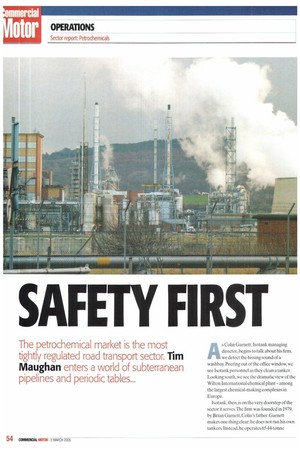
Page 57
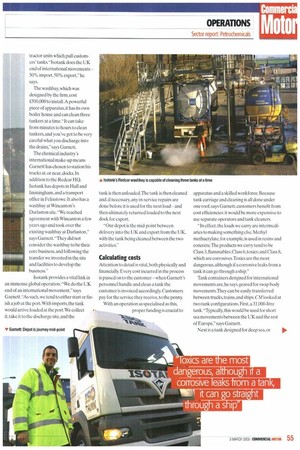
Page 58
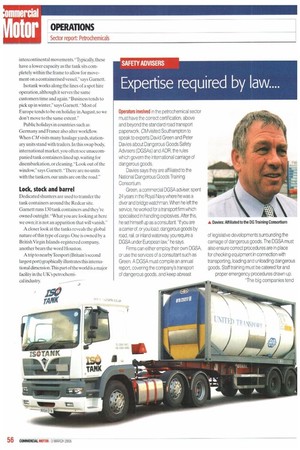
Page 59
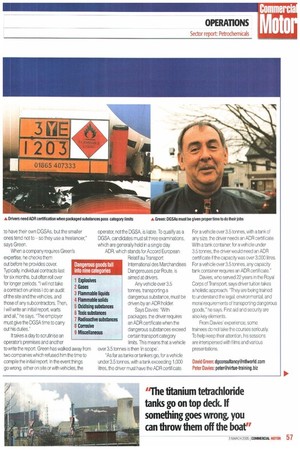
Page 60
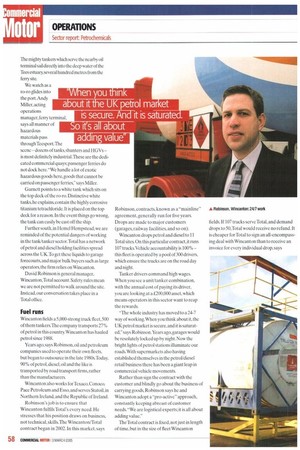
Page 61
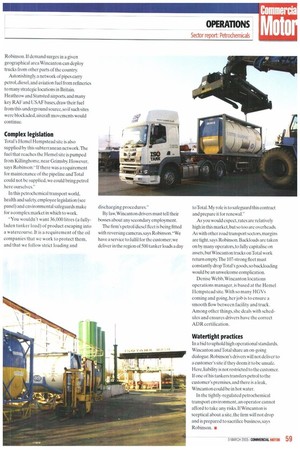
If you've noticed an error in this article please click here to report it so we can fix it.
The petrochemical market is the most
tightly regulated road transport sector. Tirn Maughan enters a world of subterranean
pipelines and periodic tables._
As Colin Garnett. Isotank managing director, begins to talk about his firm, we detect the hissing sound of a washbay.Peering out of the office window, we see Isotank personnel as they clean a tanker. Looking south, we see the dramatic view of the Wilton International chemical plant — among the largest chemical-making complexes in Europe.
Isotank, then. is on the very doorstep of the sector it serves.The firm was founded in 1979, by Brian Garnett, Colin's father. Garnett makes one thing clear: he does not run his own tankers. Instead, he operates 65 44-tonne tractor units which pull customers' tanks."Isotank does the UK end of international movements — 50% import.50°/0 export," he says.
The washbay, which was designed by the firm, cost £500,000 to install.A powerful piece of apparatus, it has its own boiler house and can clean three tankers at a time. "It can take from minutes to hours to clean tankers, and you've got to be yen, careful what you discharge into the drains," says Garnett.
The chemical industry's international make-up means Garnett has chosen to station his trucks at, or near, docks. In addition to the Redcar HQ, Isotank has depots in Hull and Immingham, and a transport office in Felixstowe. It also has a washbay at Wincanton's Darlaston site."We reached agreement with Wincanton a few years ago and took over the existing washbay at Darlaston," says Garnett. "They did not consider the washbay to be their core business, and following the transfer we invested in the site and facilities to develop the business."
lsotank provides a vital link in an immense global operation."We do the UK end of an international movement," says Garnett, "As such, we tend to either start or finish a job at the port. With imports, the tank would arrive loaded at the port.We collect it, take it to the discharge site, and the tank is then unloaded. The tank is then cleaned and, if necessary, any in-service repairs are done before it is used for the next load — and then ultimately returned loaded to the next dock for export.
"Our depot is the mid-point between delivery into the UK and export from the UK, with the tank being cleaned between the two
Calculating costs
Attention to detail is vital, both physically and financially. Every cost incurred in the process is passed on to the customer — when Garnett's personnel handle and clean a tank the customer is invoiced accordingly. Customers pay for the service they receive, to the penny With an operation as specialised as this, proper funding is crucial to apparatus and a skilled workforce. Because tank carriage and cleaning is all done under one roof, says Garnett,customers benefit from cost efficiencies: it would be more expensive to use separate operators and tank cleaners.
"In effect, the loads we carry are intermediaries to making something else. Methyl methacrylate, for example, is used in resins and concrete.The products we carry tend to be Class 3, flarnmables: Class 6, toxics; and Class 8, which are corrosives. Toxics are the most dangerous, although if a corrosive leaks from a tank it can go through a ship."
Tank containers designed for international movements are, he says, geared for swap body movements.They can be easily transferred between trucks, trains, and ships. CM looked at two tank configurations. First, a 31,000-litre tank.-Typically, this would be used for short sea movements between the UK and the rest of Europe," says Garnett.
Next is a tank designed for deep sea, or intercontinental movements."Typically, these have a lower capacity as the tank sits completely within the frame to allow for movement on a containerised vessel," says Garnett.
Isotank works along the lines of a spot hire operation, although it serves the same customers time and again. "Business tends to pick up in winter," says Garnett. 'Most of Europe tends to be on holiday in August, so we don't move to the same extent" Public holidays in countries such as Germany and France also alter workflow. When CM visits many haulage yards, stationary units stand with trailers. In this swap body, international market, you often see unaccompanied tank containers lined up, waiting for disembarkation, or cleaning."Look out of the window," says Garnett. "There are no units with the tankers, our units are on the road."
Lock, stock and barrel
Dedicated shunters are used to transfer the tank containers around the Redcar site. Garnett runs 130 tank containers and they're owned outright. "What you are looking at here we own; it is not an apparition that will vanish."
A closer look at the tanks reveals the global nature of this type of cargo. One is owned by a British Virgin Islands-registered company, another bears the word Houston.
A trip to nearbyTeesport (Britain's second largest port) graphically illustrates this international dimension.This part of the world is a major facility in the UK's petrochemical industry. Operators involved in the petrochemical sector must have the correct certification, above and beyond the standard road transport paperwork. CMvisited Southampton to speak to experts David Green and Peter Davies about Dangerous Goods Safety Advisers (DGSAs) and ADR, the rules which govern the international carriage of dangerous goods.
Davies says they are affiliated to the National Dangerous Goods Training Consortium.
Green, a commercial DGSA adviser, spent 24 years in the Royal Navy where he was a dyer and bridge watchman, When he left the service, he worked for a transport f irm which specialised in handling explosives. After this, he set himseR up as a consultant. If you are a carrier of, or you load, dangerous goods by road, rail, or inland waterway, you require a DGSA under European law," he says.
Firms can either employ their own DGSA, or use the services of a consultant such as Green. A DGSA must compile an annual report, covering the company's transport of dangerous goods, and keep abreast of legislative developments surrounding the carriage of dangerous goods. The DGSA must also ensure correct procedures are in place for checking equipment in connection with transporting, loading and unloading dangerous goods. Staff training must be catered for and proper emergency procedures drawn up.
The big companies tend to have their own DGSAs, but the smaller ones tend not to so they use a freelancer," says Green.
When a company requires Green's expertise, he checks them out before he provides cover. Typically, individual contracts last for six months, but often roll over for longer periods. "I will not take a contract on unless do an audit of the site and the vehicles, and those of any subcontractors. Then, I will wrlte an initial report, warts and all," he says. "The employer must give the DGSA time to carry out his duties."
It takes a day to scrutinise an operator's premises and another to write the report. Green has walked away from two companies which refused him the time to compile the initial report. In the event things go wrong, either on site or with vehicles, the operator, not the DGSA, is liable. To qualify as a DGSA, candidates must sit three examinations, which are generally held in a single day.
ADR, which stands for Accord European Relatif au Transport International des Merchandises Dangereuses par Route, is aimed at drivers.
Any vehicle over 3.5 tonnes, transporting a dangerous substance, must be driven by an ADR holder, Says Davies: "With packages, the driver requires an ADR certificate when the dangerous substances exceed certain transport category limits, This means that a vehicle over 3.5 tonnes Is then 'in scope'.
"As far as tanks or tankers go, for a vehicle under 3.5 tonnes, with a tank exceeding 1,000 litres, the driver must have the ADR certlf icate. For a vehicle over 3.5 tonnes, with a tank of any size, the driver needs an ADR certificate. With a tank container, for a vehicle under 3.5 tonnes, the driver would need an ADR cedicate if the capacity was over 3,000 litres. For a vehicle over 3.5 tonnes, any capacity tank container requires an ADR certificate."
Davies, who served 22 years in the Royal Corps of Transport, says driver tuition takes a holistic approach. 'They are being trained to understand the legal, environmental, and moral requirements of transporting dangerous goods," he says. First aid and security are also key elements.
From Davies experience, some trainees do not take the courses seriously. To help keep their attention, his sessions are interspersed with films and various presentations. The mighty tankers which serve the nearby oil terminal sail directly into the deep water of the Tees estuatyseveral hundred metres from the ferry site.
We watch as a ro-ro glides into the port. Andy Miller, acting operations manager,ferry terminal, says all manner of hazardous materials pass throughTeesport.The scene —dozens of tanks. shunters and HGVs — is most definitely industrial.These are the dedicated commercial quays; passenger ferries do not dock here. "We handle a lot of exotic hazardous goods here, goods that cannot be carried on passenger ferries," says Miller.
Garnett points to a white tank which sits on the top deck of the ro-ro. Distinctive white tanks, he explains,contain the highly corrosive titanium tetrachloride. It is placed on the top deck for a reason. In the event things go wrong, the tank can easily be cast off the ship.
Further south,in Hemel Hempstead, we are reminded of the potential dangers of working in the tank/tanker sector.Total has a network of petrol and diesel holding facilities spread across the UK.To get these liquids to garage forecourts, and major bulk buyers such as large operators, the firm relies onWincanton.
David Robinson is general manager. Wineanton,Total account. Safety rules mean we are not permitted to walk around the site. Instead, our conversation takes place in a Total office.
Fuel runs Wincanton fields a 5,000-strong truck fleet, 500 of them tarikers.The company transports 27% of petrol in this country. Wincanton has hauled petrol since 1988.
Years ago, says Robinson, oil and petroleum companies used to operate their own fleets, but began to outsource in the late 1980s .Today. 90% of petrol, diesel, oil and the like is transported by road transport firms, rather than the manufacturers.
Wincanton also works for Texaco, Conoco, Pace Petroleum and Esso, and serves Statoil.in Northern Ireland, and the Republic of Ireland.
Robinson's job is to ensure that Wincanton fulfils Total's every need. He stresses that his position draws on business, not technical, skills. The Wincanton/Total contract began in 2002. In this market, says Robinson, contracts, known as a "mainline" agreement, generally run for five years. Drops are made to major customers (garages, railway facilities, and so on).
Wincanton drops petrol and diesel toll Total sites. On this particular contract, it runs 107 trucks.Vehicle accountability is 100% — this fleet is operated by a pool of 300 drivers, which ensure the trucks are on the road day and night.
Tanker drivers command high wages. When you see a unit/tanker combination, with the annual cost of paying its driver, you are looking at a £200,000 asset, which means operators in this sector want to reap the rewards.
-The whole industry has moved to a 24-7 way of working. When you think about it, the UK petrol market is secure, and it is saturated," says Robinson.Years ago, garages would be resolutely locked up by night. Now the bright lights of petrol stations illuminate our roads. With supermarkets also having established themselves in the petrol/diesel retail business there has been a giant leap in commercial vehicle movements.
Rather than sign the contract with the customer and blindly go about the business of carrying goods. Robinson says he and Wincanton adopt a "pro-active" approach, constantly keeping abreast of customer needs."We are logistical experts; it is all about adding value."
The Total contract is fixed, not just in length of time, but in the size of fleet Wincanton fields. If 107 trucks serve Total, and demand drops to 50,Total would receive no refund. It is cheaper for Total to sign an all-encompassing deal with Wincanton than to receive an invoice for every individual drop, says Robinson. If demand surges in a given geographical area Wincanton can deploy trucks from other parts of the country.
Astonishingly, a network of pipes carry petrol,diesel,and aviation fuel from refineries to many strategic locations in Britain. Heathrow and Stansted airports. and many key RAF and USAF bases, draw their fuel from this underground source, so if such sites were blockaded, aircraft movements would continue.
Complex legislation
Total's Hemel Hempstead site is also supplied by this subterranean network.The fuel that reaches the Hemel site is pumped from Killinghome, near Grimsby. However, says Robinson: "If there was a requirement for maintenance of the pipeline and Total could not be supplied, we could bring petrol here ourselves."
In this petrochemical transport world, health and safety, employee legislation (see panel) and environmental safeguards make for a complex market in which to work.
-You wouldn't want 36,000 litres (a fullyladen tanker load) of product escaping into a watercourse. It is a requirement of the oil companies that we work to protect them, and that we follow strict loading and discharging procedures."
By law, Wincanton drivers must tell their bosses about any secondary employment.
The firm's petrol/diesel fleet is being fitted with reversing cameras, says Robinson."We have a service to fulfil for the customer; we deliver in the region of 500 tanker loads a day to Total. My role is to safeguard this contract and prepare it for renewal.
As you would expect, rates are relatively high in this market, but so too are overheads. As with other road transport sectors, margins are tight. says Robinson. Backloads are taken on by many operators, to fully capitalise on assets, but Wincanton trucks on Total work return empty.The 107-strong fleet must constantly dropTotal's goods,so backloading would be an unwelcome complication.
Denise Webb, Wincanton locations operations manager, is based at the Hemel I lempstead site.With so many HGVs coming and going, her job is to ensure a smooth flow between facility and truck. Among other things, she deals with schedules and ensures drivers have the correct ADR certification.
Watertight practices
In a bid to uphold high operational standards, Wincanton and Total share an on-going dialogue. Robinson's drivers will not deliver to a customer's site if they deem it to be unsafe. Here, iability is not restricted to the customer. If one of his tankers transfers petrol to the customer's premises, and there is a leak, Wincanton could be in hot water.
In the tightly-regulated petrochemical transport environment, an operator cannot afford to take any risks. If Wincanton is sceptical about a site, the firm will not drop and is prepared to sacrifice business, says Robinson. •










































































































































































































